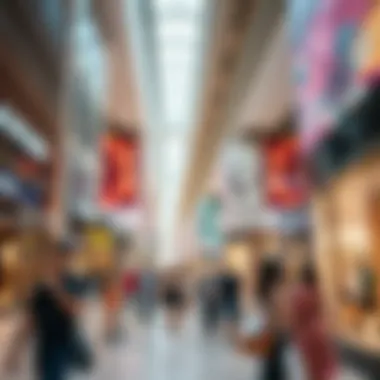The Dynamics of Retail in Dubai: An In-depth Analysis


Intro
Dubai's retail landscape is nothing short of a fascinating puzzle, intricately woven with threads of luxury, technology, and an ever-evolving consumer base. The city has emerged as a global shopping destination, drawing in tourists, expats, and local shoppers alike. With opulent malls, traditional souks, and a growing trend towards online shopping, the dynamics at play are particularly rich and deserve an in-depth examination.
As we peel back the layers of this vibrant environment, we encounter a distinct mix of cultural influences and modernity that sets Dubai apart. Retail here isn’t merely about buying or selling; it’s an experience that reflects the very essence of the city. The blend of glitzy storefronts with age-old trading practices creates a unique atmosphere, drawing in those who seek both luxury and authenticity. Investors, businesses, and market analysts will find that understanding these dynamics can pave the way for substantial opportunities and informed decision-making.
The subsequent sections will delve into market trends, investment opportunities, and the technological advancements driving this industry. As we navigate through this complex and dynamic sector, we will also highlight challenges that could influence growth and potential strategies for overcoming them. Let’s begin by exploring the current market trends, which serve as the foundation for the retail sector in Dubai.
Market Trends
Current Real Estate Landscape
The real estate market in Dubai is a testament to the city's ambition and strategic vision. Over the past decade, significant developments have emerged, reflecting both local and international demand. The blend of high-end retail spaces, mixed-use developments, and the traditional souk offers a compelling backdrop for retailers.
Malls such as The Dubai Mall and Mall of the Emirates continue to be key players, attracting millions of visitors annually. However, it’s essential to recognize that the retail market is not solely confined to these monumental spaces; a shift towards niche and experiential retailing is increasingly noticeable.
For instance, recent developments in areas like Al Quoz highlight the transformation of industrial spaces into trendy shopping destinations, catering to a more youthful demographic. This evolution signifies a growing preference for unique shopping experiences over traditional formats, illustrating the shifting sands of consumer behavior.
Property Price Trends
On the property front, fluctuations in prices are indicative of broader economic conditions and consumer sentiment. Recent trends show a stabilization in rental rates across popular areas, with opportunities beginning to arise in emerging neighborhoods. According to data from real estate platforms like Property Finder and Bayut, average rental prices for retail spaces have seen a modest increase, particularly in thriving Mixed-Use developments.
"Understanding property price trends is vital for investors. It allows them to identify high-return areas while being mindful of shifting consumer preferences."
For those considering an investment, areas like Downtown Dubai and Dubai Marina are often seen as prime locations. Yet, emerging neighborhoods also present an enticing blue ocean of possibilities—lesser-known yet vibrant localities might yield impressive returns in the long run.
Investment Opportunities
High-Return Areas
Investors looking to dip their toes into Dubai's retail waters should zero in on areas that demonstrate potential for growth. Popular districts such as Al Wasl and Jumeirah are gaining traction among boutique retailers, lured by the affluent local population and increasing foot traffic from tourists. Additionally, areas surrounding the Expo 2020 site are forecasted to see significant post-event benefits, with retail spaces likely to be in high demand.
The rise of e-commerce cannot be overlooked, as adapting to hybrid shopping experiences could set retailers apart. Investing in locations that support omnichannel strategies may provide a competitive edge, as consumer habits continue to pivot.
Upcoming Developments
Apart from established areas, prospective investors should keep an eye on upcoming developments in Dubai. Projects like Dubai Creek Harbour and the Dubai South area present exciting prospects, combining a vision for sustainable living with retail innovation. Groundbreaking developments often come with built-in communities, enhancing the value of investment while ensuring retailers have a steadfast customer base.
Emerging developments are also integrating advanced technology, such as smart shopping features and enhanced customer experiences. Investors should consider how these technological advancements will shape the retail landscape, making it imperative to align business strategies with future trends.
A comprehensive understanding of these opportunities, juxtaposed with challenges, will empower investors and retail businesses to make informed decisions. As we continue on this journey, we’ll explore the ongoing challenges within the Dubai retail framework, providing critical insights into navigating this dynamic market.
[Source: Dubai Land Department - https://dubailand.gov.ae/] [More information on retail trends can be found at - https://www.bayut.com/] [Explore retail properties via Property Finder - https://www.propertyfinder.ae/]
Prelude to Dubai's Retail Sector
The retail sector in Dubai stands as a testament to the region's rapid development and economic diversification. Over the years, this dynamic environment has transformed from traditional souks filled with local products to an elaborate network of global retail brands and shopping experiences. Understanding the nuances of this sector is essential for investors and analysts alike, as it presents numerous opportunities shaped by demographic shifts, technological advancements, and cultural influences.
The importance of retail in Dubai cannot be overstated. It serves not only as a commercial hub but also as a cultural intersection where diverse nationalities converge, each bringing its unique preferences and behaviors. The sector plays a crucial role in employment, tourism, and overall economic stability. To truly grasp the potential and challenges of investing or operating within this market, it is imperative to explore retail’s intricacies.
Overview of Retail Importance in Dubai
Dubai's retail landscape is vital due to several interlinked factors:
- Economic Contribution: Retail contributes significantly to Dubai's GDP, providing jobs and fostering entrepreneurship through countless small and large businesses.
- Tourism Influence: As a recognized tourist destination, the retail sector benefits from millions of visitors each year, notably during shopping festivals like the Dubai Shopping Festival, which attracts global shoppers.
- Cultural Exchange: Retail in Dubai reflects the melting pot of cultures present in the city. Shopping experiences often intertwine local traditions with international flair, enhancing visitor attractions.
To illustrate, a recent report showed that more than 60% of tourists allocate part of their travel budget to retail, revealing the sector’s attractiveness. This further underlines the necessity for ongoing analysis and adaptability among retail stakeholders to meet ever-evolving consumer expectations.


Historical Development of Retail in Dubai
The historical trajectory of retail in Dubai offers insight into how current trends have emerged. Beginning with traditional markets, or souks, known for spices, textiles, and gold, these spaces allowed local merchants to thrive and connect with the community. The establishment of the Dubai Shopping Festival in 1996 marked a pivotal moment. This event amplified the city’s appeal as a shopping destination, attracting flocks of consumers.
With the rise of modern shopping malls such as The Dubai Mall and Mall of the Emirates, retail began to evolve into a more sophisticated and structured industry. These malls not only provide shopping options but also include entertainment, dining, and leisure facilities, creating a holistic consumer experience.
Moreover, the shift towards e-commerce began to take root in Dubai during the late 2000s, pushing traditional retailers to adapt to the digital landscape. Companies now invest in omnichannel strategies to cater to tech-savvy consumers who demand convenience and instant access to products.
As the retail environment of Dubai continues to mature and diversify, understanding its historical roots helps stakeholders anticipate future trends and capitalize on emerging opportunities. Investors and market analysts must stay vigilant to the continuous shifts within this dynamic sector.
Key Characteristics of Dubai's Retail Landscape
Understanding the characteristics that define Dubai's retail environment is critical in grasping its unique appeal and how it serves both local and international markets. This section dives into the essential elements that make up Dubai's retail landscape, from the blend of traditional and modern retail practices to the transformative rise of e-commerce. Each element is interconnected and contributes significantly to the overall vibrancy of the sector.
Integration of Traditional and Modern Retail
Dubai stands out as a melting pot where tradition meets modernity. You can stroll through the bustling lanes of the Souk Madinat Jumeirah or the Dubai Gold Souk, and on the next corner, experience the dazzling spectacle of The Dubai Mall.
Here, one might encounter the vibrant atmosphere of a traditional souk, showcasing local crafts and spices. Yet, just minutes away, luxury brands such as Gucci and Prada await in air-conditioned comfort, appealing to an international clientele. This integration allows shoppers to engage with local culture while also enjoying the convenience and luxury associated with modern retail.
"The balance between local flavors and global brands is what keeps Dubai's retail scene thriving."
This unique duality benefits various stakeholders: small local artisans can thrive amidst high-end competition, while international retail giants gain access to a diverse consumer base. Not only does this arrangement create a rich shopping experience, but it also encourages a spirit of competition that pushes retailers to innovate continually.
Role of Malls and Shopping Centers
Malls and shopping centers in Dubai are not just places to buy goods; they are social hubs that reflect the essence of the city's lifestyle. The concept of a mall in Dubai is entirely redefined, where shopping is merely one part of a broader experience that includes dining, entertainment, and leisure activities.
For instance, The Mall of the Emirates, known for its indoor ski slope and luxury offerings, surpasses traditional shopping norms. Visitors can ski down slopes even in 45-degree heat, providing an unusual experience that adds value to their retail journey. Such malls foster community connections, encourage longer visits, and ultimately drive up sales across various sectors within the mall.
In addition to housing a multitude of shopping options, many of these centers also integrate cultural exhibitions and events, enhancing the engagement of the visitor population and showcasing Dubai's richness in diversity. As these centers become more than just shopping venues, their role in the overall retail landscape becomes integral to shaping consumer behavior.
Emergence of E-commerce
E-commerce has burst onto the scene in Dubai, reworking the retail infrastructure entirely. The pandemic, which sparked a global shift toward online shopping, accelerated an already growing trend in the UAE. Major players like noon.com and Amazon.ae witnessed unprecedented growth, catering to the tech-savvy, mobile-oriented populace.
The convenience of online shopping appeals broadly, especially with the rise of same-day delivery services that can whisk goods straight from a warehouse to a shopper's door in record time. Such advancements promote a new form of consumer behavior, highlighting the importance of integrating an online presence with physical retail strategies.
Furthermore, the growth of payment gateways and digital wallets ensures seamless transactions—both locally and globally—enhancing the online shopping experience. As retailers adapt and invest in their digital storefronts, they leverage data analytics to fine-tune their offerings, making personalized shopping experiences the new norm.
Overall, the emergence of e-commerce complements the traditional retail experience in Dubai, enabling retailers to reach a computing-savvy audience while also providing the convenience that modern consumers value highly.
As the retail scene in Dubai evolves, one thing remains clear: the characteristics shaping it today are a dynamic amalgamation of tradition, modernity, and innovation that sets it apart in the global landscape.
Impact of Tourism on Retail
Tourism plays a pivotal role in shaping the retail landscape of Dubai. The city, often referred to as the retail mecca of the Middle East, has cultivated a unique shopping environment where the convergence of culture, commerce, and convenience materializes. With an annual influx of millions of visitors, the impact of tourism on the local retail sector cannot be understated. As tourists explore the lavish shopping malls, local souks, and high-end boutiques, they significantly contribute to the overall economic landscape and, more specifically, the retail segment.
Visitor Demographics and Spending Patterns
Understanding the demographics of visitors is key to unraveling the spending patterns that define retail in Dubai. The city attracts a diverse mix of international tourists, ranging from affluent travelers from Europe and North America to budget-conscious visitors from neighboring countries. This varied landscape influences how much and what kinds of products are purchased.
Spending habits can differ remarkably based on the visitor's country and purpose of visit. Travelers from GCC countries often favor luxury goods, pouring their spending into high-end fashion brands available in Dubai's posh malls. On the other hand, tourists from more budget-friendly backgrounds might opt for local artisan products or discount brands, reflecting their priorities and disposable income.
- Luxury vs. Budget:
- Luxury Shoppers: Seek unique experiences and high-quality products, often investing heavily in luxury brands.
- Budget Shoppers: Focus on value, frequently buying local goods and souvenirs.


It's also noteworthy that certain events like the Dubai Shopping Festival or seasonal sales impact spending patterns; visitors tend to set aside larger budgets during these times, showcasing their willingness to splurge on exclusive offers.
Seasonal Trends in Retail
The retail landscape in Dubai mirrors the cycles of tourism, leading to pronounced seasonal trends throughout the year. Understanding these seasonal patterns is crucial for retailers looking to capitalize on peak shopping times.
- Peak Season: During the winter months, particularly around Christmas and New Year, Dubai sees a surge in tourists escaping colder climates. Retailers often prepare for this influx with special promotions and limited-time offers aimed at enticing both locals and tourists alike.
- Summer Months: Conversely, during the sweltering summer, when temperatures skyrocket, tourism typically dips. Retail strategies shift towards indoor attractions and entertainment-based shopping experiences. Malls convert into hubs of activity, with family-friendly events and activities designed to keep customers engaged despite the heat.
- Eid Festivals: Additionally, religious observances, especially Eid, establish another peak from a consumer spending perspective. Special sales and promotions cater specifically to this period, prompting many to indulge in shopping as a celebratory activity.
Not only do these seasonal trends influence retail sales directly, but they also shape inventory decisions, marketing strategies, and customer experiences. Retailers must remain agile, adapting to the shifting demands dictated by tourism cycles, ensuring that they effectively meet the needs of their varied clientele.
Technological Innovations in Retail
Technological innovations are shaping the retail landscape in Dubai in profound ways. With its unique position as a global hub for trade and commerce, Dubai has embraced various technologies that drive efficiencies, enhance customer experiences, and streamline operations. Retailers in this thriving metropolis are not just adopting technology; they are often pioneering new solutions that can redefine the shopping experience both physically and online.
Given the competitive nature of the retail sector here, understanding these innovations is crucial for investors and businesses looking to make informed decisions. Key areas such as digital marketing strategies and the influence of social media on consumer behavior spotlight how technology transforms retail practices.
Digital Marketing Strategies
Digital marketing has become a cornerstone of retail in Dubai, transforming how brands connect with consumers. Businesses leverage tools like search engine optimization (SEO), pay-per-click (PPC), and email campaigns to reach targeted audiences effectively.
- Search Engine Optimization (SEO): Retailers are increasingly optimizing their websites to improve online visibility. By integrating local keywords, businesses can draw in more regional customers while targeting international shoppers as well.
- Pay-Per-Click Advertising: Brands use PPC campaigns on platforms like Google AdWords to ensure their products are seen by potential customers actively searching for similar offerings. This immediacy translates into higher conversion rates, making it an attractive avenue.
- Email Marketing: Email campaigns offer a direct line to consumers, enabling retailers to share promotions, new arrivals, or personalized recommendations. With sophisticated analytical tools, firms can tailor messages based on user data to increase engagement.
Overall, digital marketing strategies not only increase reach but can also create a more personalized shopping experience, which is critical in capturing the attention of Dubai's diverse consumer base.
Influence of Social Media on Consumer Behavior
In an age of hyper-connectivity, social media plays a pivotal role in shaping consumer behavior. Platforms like Instagram, Facebook, and TikTok provide retailers with direct access to millions of potential customers.
- Brand Engagement: Brands engage with audiences by creating relatable content and interactive campaigns. Sharing visually enticing products through platforms significantly impacts purchasing decisions, especially among millennials and Gen Z shoppers who favor visually-driven shopping experiences.
- User-Generated Content: The power of user-generated content cannot be underestimated. Retailers encourage customers to share their own experiences, which enhances credibility and builds trust. This kind of social proof can sway hesitant buyers.
- Influencer Collaborations: Collaborating with social media influencers has become a common strategy. Influencers can connect with their followers in authentic ways, effectively translating their influence into sales for retail brands.
"Social media is not just about being heard; it’s about being understood. In the retail environment of Dubai, where diversity reigns, understanding your audience is crucial."
The influence of social media on the retail landscape in Dubai echoes the adaptability of businesses that cater to a cosmopolitan population. By focusing on these platforms, retailers ensure they remain relevant and accessible.
Innovation in technology is a crucial lever for the retail sector in Dubai. As digital marketing tools evolve and transform consumer engagement, retailers must stay ahead of the curve to capitalize on these advancements.
Challenges Facing Retail in Dubai
The retail sector in Dubai is a vibrant tapestry woven from diverse threads of tradition, culture, and innovation. However, it is not without its challenges, which can impact both existing businesses and potential investors alike. Understanding these challenges is essential for anyone looking to navigate the complexities of Dubai's retail landscape. The interplay of fierce competition, burgeoning regulatory frameworks, and the saturation of the market requires careful consideration to maintain a competitive edge and ensure sustainability in this dynamic environment.
Market Saturation and Competition
Dubai's retail market has matured significantly over the last few decades, leading to a landscape that can sometimes feel overcrowded. Businesses are vying for the attention of a consumer base that is both discerning and diverse. With numerous shopping malls, street markets, and pop-up stores dotting the city, newcomers often find themselves elbow-deep in a crowded market.
- High Entry Costs: Starting a retail operation in Dubai involves navigating high real estate prices along with hefty setup costs. For instance, prime retail spaces in areas like The Dubai Mall or Mall of the Emirates command a premium that can be a barrier for many brands.
- Innovative Marketing Needed: Competing against established brands means that retailers must invest in unique marketing strategies that can make their offerings stand out. This can include everything from interactive digital displays to loyalty programs that reward frequent shoppers.
- Seasonal and Cultural Fluctuations: Retailers must be adept at understanding the local culture and keeping pace with shifting consumer preferences, often influenced by tourism and seasonal activities, a task that is neither simple nor straightforward.
Overtime, many businesses face the stark reality that being present in a saturated market requires creative differentiation and strategic agility. Otherwise, they risk being lost in the shuffle of consumer options.
Regulatory Frameworks and Compliance
In conjunction with market saturation, navigating the regulatory landscape in Dubai presents its own set of challenges. The legal frameworks governing retail operations can be complex, varying widely from one sector to another.
- Understanding Compliance Obligations: Businesses must be aware of various compliance requirements, including product safety regulations, labeling requirements, and VAT laws. Non-compliance can result in hefty fines, thereby impacting profitability.
- Licensing and Permits: Retailers are also required to obtain specific licenses related to their operations, which can involve navigating bureaucratic processes that may appear laborious. These include trade licenses from the Department of Economic Development and, where relevant, additional permits from various governmental bodies like the Dubai Health Authority for food-related businesses.
- Changes in Regulations: As Dubai continues to evolve as a global retail hub, regulators often revise existing laws or introduce new ones to support growth. This requires businesses to stay agile and adaptable, ready to respond quickly to shifts in the regulatory environment.
"Understanding the regulatory landscape and remaining compliant is crucial for sustainable growth in Dubai's retail market. Neglecting this can be detrimental to even the most well-intentioned businesses."
Both the elements of market saturation and regulatory frameworks intertwine, requiring retailers to deploy strategic approaches that focus on innovation, compliance, and proactive engagement with local customs and laws. Investors and businesses cannot afford to overlook these aspects if they wish to flourish in Dubai's retail sector.


Sustainability and Ethical Considerations
Sustainability and ethical considerations play a crucial role in shaping the retail sector in Dubai. As a city known for its extravagant shopping experiences and rapid economic growth, the pressure to align with sustainable practices has never been greater. Retailers are increasingly aware that consumers now favor brands that not only offer quality products but also demonstrate a commitment to social and environmental responsibility. This shift in consumer behavior has propelled sustainability from a mere trend to an essential component of business strategy.
The importance of this topic in the context of Dubai's retail landscape cannot be understated. A growing number of local and international retailers are adopting green practices, fostering a sense of accountability while enhancing their brand image. Praise for companies that prioritize sustainability can influence consumer choices immensely, especially in a region where luxury and eco-consciousness are sometimes seen as opposing forces.
Green Retail Practices
Adopting green retail practices in Dubai encapsulates various strategies that aim to minimize environmental impact. Retailers, once strictly focused on profit margins, are now reevaluating their operations to incorporate eco-friendly measures. Common examples of green retail practices include:
- Energy-efficient designs: Many shopping malls and stores are increasingly investing in sustainable architecture and technologies. For instance, the Mall of the Emirates has included solar panels to power its operations, reflecting a commitment to reducing carbon footprints.
- Recycling initiatives: Promoting recycling through campaigns to minimize waste is gaining ground in Dubai. Various retailers encourage customers to return packaging materials, which can then be repurposed or recycled.
- Sustainable sourcing: Retailers are also focusing on ethically sourced materials. This practice not only caters to environmentally-conscious consumers but also ensures fair labor practices in the supply chain.
"Incorporating sustainability practices provides a unique selling point in Dubai's competitive retail landscape, distinguishing brands and engaging environmentally-aware consumers."
The commitment to green retail practices resonates with both residents and tourists in Dubai. As the nation continues to host global events like Expo 2020, the emphasis on sustainable retail is gaining notable attention, influencing a shift in consumer expectations.
Corporate Social Responsibility in Retail
Corporate Social Responsibility (CSR) in Dubai's retail sector is more than just a buzzword. It encapsulates the responsibility of retailers to operate ethically while contributing positively to society. This concept plays a critical role in establishing trust and loyalty among consumers. The evolution of CSR in the Dubai retail space often manifests in several ways:
- Community engagement: Retailers have begun to invest in local communities through various initiatives. For example, partnerships with local charities provide essential goods and services to less fortunate residents, fostering goodwill and supporting social welfare.
- Employee welfare: A significant aspect of CSR is the well-being of employees. Retailers in Dubai are starting to focus on fair wages, safe working conditions, and career development opportunities, which enhance employee satisfaction and productivity.
- Supporting local artisans: Many global brands operating in Dubai are teaming up with local artisans to showcase traditional crafts. This not only boosts local economies but also helps preserve cultural heritage.
The Future of Retail in Dubai
The retail sector in Dubai is not just thriving; it’s evolving at a pace that attracts global attention. The importance of understanding this evolution cannot be overstated. Investors, businesses, and market analysts should consider how various dynamics are shaping the future landscape of retail. A blend of market forces, technological advancements, and changing consumer preferences are all pivotal on this journey.
Predicted Trends and Developments
As Dubai heads into the future, a few trends are likely to reshape the retail environment significantly. Here are some key developments:
- Omni-channel Retailing: The seamless integration of in-store and online experiences is anticipated to become the gold standard. Consumers are increasingly expecting a fluid shopping experience. They may browse online, check stock in-store, and choose between home delivery or click-and-collect.
- Experiential Retail: Shops in Dubai might transform into venues for experiences rather than just points of sale. Think about interactive showrooms where customers engage with products first-hand before making purchases. This practice reinforces the emotional connection between brands and consumers, which is crucial.
- Smart Stores: Technological advancements will lead to smart stores equipped with artificial intelligence, offering personalized shopping experiences. Retailers could track customer preferences and habits, allowing them to curate offers tailored to individual shoppers. Ensuring efficiency in payment processing and inventory management will also enhance the overall experience.
- Sustainability Initiatives: With consumers increasingly prioritizing eco-friendly practices, retailers might focus on sustainable sourcing and packaging. Green initiatives not only cater to customer sentiments but also contribute towards a positive corporate image.
- Digital Currencies: The emergence of blockchain technology and cryptocurrencies might see their integration into retail transactions. Dubai, being a forward-thinking city, could lead the way in adopting these digital currencies in mainstream shopping.
"Retail in Dubai is not set just on trends; it's consistently redefined by innovation and adaptability, making it an exciting market to watch."
The interplay among these trends will create a robust and dynamic retail environment that appeals to both local and international audiences.
Investment Opportunities
Investment in Dubai's retail sector is poised to be a lucrative venture. Here’s why:
- High Tourist Influx: With millions of tourists visiting yearly, there is a consistent footfall that supports retail growth. Strategic investments in high-traffic areas can yield significant returns.
- Government Support: The Dubai government is keen on diversification and encourages foreign investment in its economy. Various free zones and incentives make setting up retail businesses attractive.
- Growing Middle-Class: The increase in the local middle class means a rising demand for various products and services. Retail ventures that cater to quality yet affordable options could tap this expanding market.
- Partnership Potential: Collaborating with local retailers can open doors for international brands. Engaging with established businesses can mitigate risks while broadening market reach.
- Tech-Driven Opportunities: Retailers investing in technological integration could leverage tools such as data analytics and customer relationship management systems. Smart investments in tech can enhance efficiencies and customer engagement significantly.
Epilogue
The conclusion serves as a pivotal reflection of the extensive analysis presented in this article. In a rapidly evolving market like Dubai's retail sector, drawing coherent insights from previous sections is not merely beneficial; it is essential. The blend of historical context, current trends, and future possibilities shapes a comprehensive understanding that investors and stakeholders must embrace.
Understanding the retail dynamics is crucial for several reasons:
- Market Viability: As an investor or business owner, recognizing the unique elements of the Dubai retail landscape can lead to informed decision-making. This knowledge can mitigate risks and spotlight rewarding ventures.
- Adaptation to Trends: With the swift advancements in technology and e-commerce, retailers must adapt swiftly. The insights gained from the article encourage continuous learning and adaptation. Ignoring these shifts could lead to being left behind.
- Resource Optimization: The exploration of sustainability and ethical practices illustrates a growing demand for conscious consumption. Incorporating these practices isn't just a trend; it's a strategy that resonates with today's savvy consumers. Investing in green retail practices not only enhances brand image but also contributes positively to the community.
Overall, the conclusion reaffirms that Dubai’s retail environment is not a mere backdrop for commerce; it is an intricate tapestry where tradition and modernity coexist. To remain competitive, it is indispensable not only to absorb insights but also to engage in ongoing discourse around the developments in the sector.
Summary of Insights
The retail landscape in Dubai encapsulates a dynamic intersection of innovation, tradition, and consumer choice. From the emergence of e-commerce to the enduring significance of traditional markets, each section of this article contributes to a multi-faceted understanding of the current landscape.
- Tourism Influence: The strong influx of tourists is integral to retail success, driving sales and altering consumer preferences. Recognizing which demographics yield the most substantial spending helps hone marketing efforts.
- Technology Role: Digital marketing strategies and social media's influence illustrate the shifting consumer behaviors. A retailer attuned to these trends will harness the power of data analytics to tailor offerings effectively.
- Future Potentials: The anticipated trends and investment opportunities reflect a hopeful outlook and a call to action for stakeholders eager to capitalize on growth. The adaptability of Dubai's market ensures that, while challenges exist, substantial opportunities linger just on the horizon.
The insights gleaned from this analysis amplify the importance of being well-versed in the dynamics of Dubai's retail sector.
Call for Continued Research
In a landscape that alters as swiftly as Dubai’s, the need for ongoing research cannot be overstated. The retail sector's nature is highly responsive to various external factors, ranging from economic conditions to shifting cultural trends. Potential areas for further study include:
- Consumer Behavior: Investigating the psychological underpinnings of consumer choices can yield valuable insights for marketers aiming to refine their engagement strategies.
- Sustainability Innovations: As the global emphasis on sustainability continues to grow, further exploration of eco-friendly practices in retail is warranted. Innovators can benefit from understanding which green initiatives resonate most with consumers.
- Technological Integration: The impact of automation and AI on retail needs deeper investigation to pinpoint how these technologies can enhance customer experiences and operational efficiencies.















